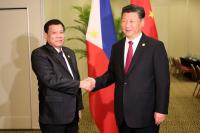
President Rodrigo Duterte and Chinese President Xi Jinping greet each during a bilateral meeting at the sidelines of the Asia-Pacific Economic Cooperation (APEC) Leaders’ Summit in Lima, Peru on November 19. REY BANIQUET/ Presidential Photo The Philippines plans to beef up its defense capabilities with the help of countries like Russia and China, as it seeks to establish industrial defense complexes in areas considered highly “vulnerable to attacks.” These complexes, which will house defense-related manufacturing firms, are targeted to be put up in places like Palawan, since it faces the Spratlys and Zambales, because of the Scarborough Shoal, said Charito B. Plaza, director general of the Philippine Economic Zone Authority (Peza). “We have military reservations that can be utilized as defense industrial complexes depending on the studies to be undertaken by the Department of National Defense (DND). I suggested that we should put up these defense industrial complexes in vulnerable areas of attacks like Palawan and Zambales,” Plaza said. ‘Window shopping’ She also suggested that two defense industrial complexes be put up in Mindanao. “This is not just about the transfer of technology. We will also be able to modernize our armed forces and the police.” Plaza explained that Peza had begun “window shopping” for prospective locators from Russia, China, Israel and other countries that have sophisticated defense industries. The target is to have locators from these countries to manufacture drones, equipment as well as the hardware and software needed by the military and police both for export and local Read More …